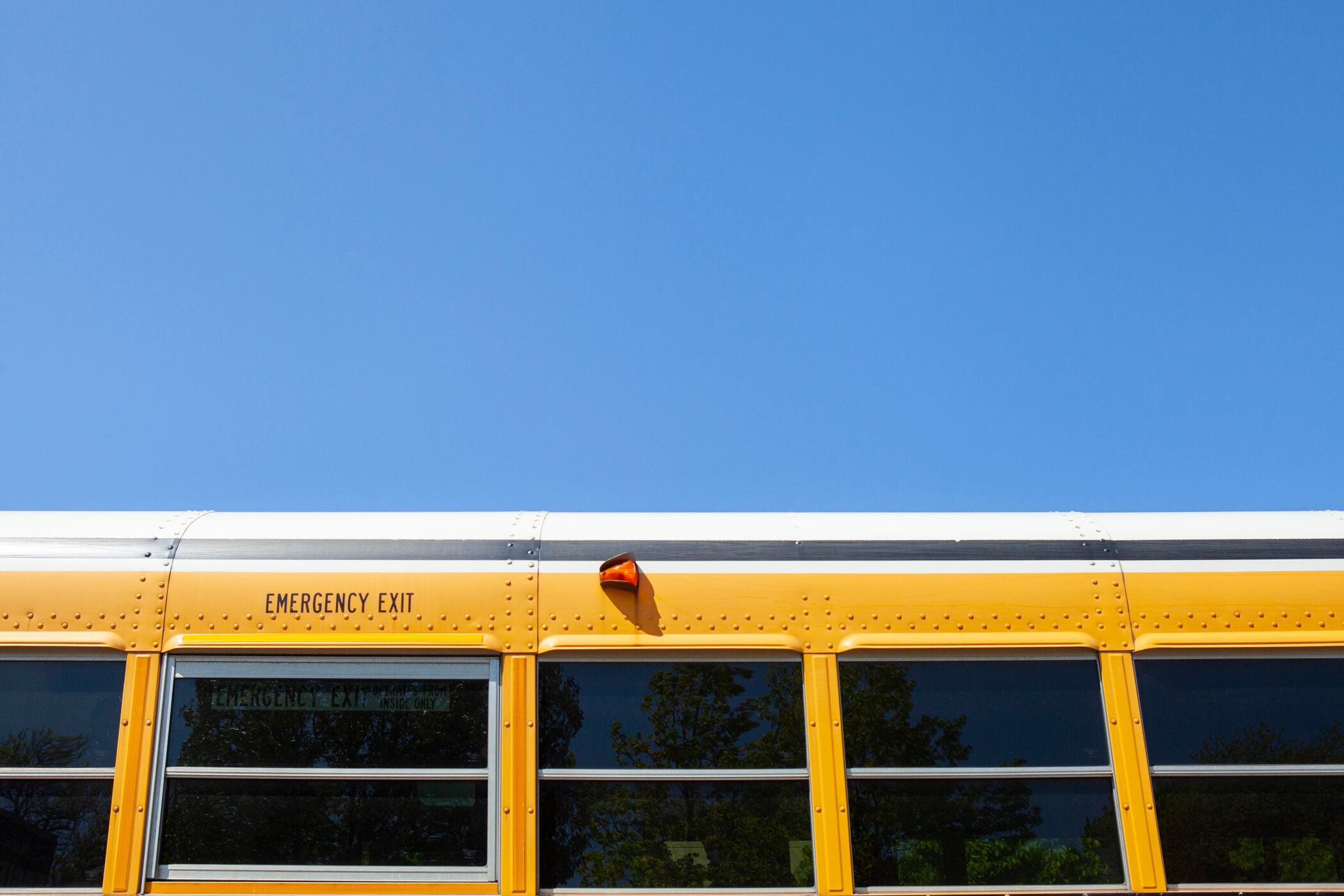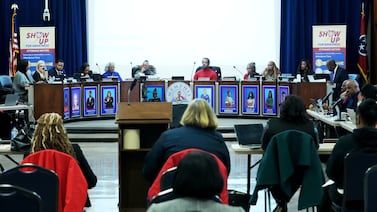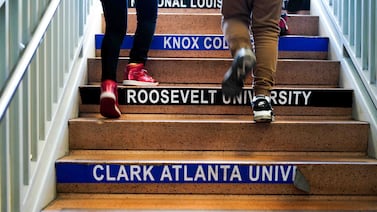Just before 9 a.m. on a recent Friday, Jeanette Sámano’s phone buzzed and her son’s name lit up the screen. The school bus hadn’t arrived for pickup outside Enrico Tonti Elementary School in Gage Park, he told her. With only 10 minutes to go before the start of his first class at Maria Saucedo Elementary School about five miles away in Little Village, Raúl, who is a diverse learner, wouldn’t be making it on time.
“I was really worried about his safety,” Sámano said, who was upset that her seventh grader would also be missing critical learning time. “My heart dropped.”
Sámano, who works an hour and half away in the suburbs, called the bus company only to be told service had been canceled for the day. The bus service provider hadn’t called parents ahead of time to let them know of the last-minute cancelation, Sámano said.
She called her husband, who left work to take their 12-year-old son to Maria Saucedo.
“They should be calling the parents so we know what to do. That way we can make alternate choices,” Sámano said. “It’s not OK.”
Weeks into the school year, Illinois families such as Sámano’s are still grappling with unreliable bus service because of the state’s school bus driver shortage and logistical problems with district planning. Parents describe how their children are dropped off at home 30-45 minutes late or later, pickups are canceled last-minute, and communication is spotty from district officials. That has left them frustrated and concerned about their children’s safety, as students have been stranded at bus stops alone or have to stay home alone because parents are working.
Chicago’s bus problems made headlines the first week of school, and district officials promised cash payments for transit assistants and a fast solution. But weeks later, several families told Chalkbeat that bus service is still a daily gamble, and data provided by Chicago Public Schools shows that even more families lack service now than at the start of the year.
Chicago is responsible for transporting about 16,000 students to and from schools every year. Currently, students with disabilities make up more than half of the outstanding transportation requests — about 2,500 out of 4,000 students across the district. Students with disabilities have transportation written into their Individualized Education Programs, and the requirement is backed by federal law.
“Like school districts across the country, the district is experiencing a shortage in drivers. CPS remains committed to providing full transportation services to students,” a Chicago Public Schools spokesperson said in a statement.
CPS is working with vendors to ramp up bus driver hiring and training to resume regularly provided transportation services, according to a CPS official.
When school started at the end of August, 2,100 students were left without a ride on the first day of school and families were offered $1,000 to cover transportation. Last month, Chicago Public School board members said 3,300 students were stranded without bus service, citing the continued bus driver shortage, but said they aimed to prioritize students with special needs. But weeks later, the bus problem hasn’t improved.
Over the last year, Chicago Public Schools also consolidated or canceled 289 bus routes.
District officials said the total number of students without transportation may vary as part of the evolving situation.
Asked to explain why more students are now without bus service, district officials said the “higher number of transportation requests can be attributed to new requests, changes in enrollment, and route assignments returned by bus companies.”
The numbers fluctuate in the first couple of months of a new school year, district officials said.
Sámano said bus service has been inconsistent all year so far, and Raúl sometimes is late for his first class, which is one of two classes that provides enhanced learning assistance to diverse learners, and on some other days there is no service. While school ends at 4 p.m.,Raúl’s bus often arrives at the school around 5:30 p.m. and doesn’t reach his drop-off location until after 6 p.m.
Families who have children with disabilities say that this isn’t the first time that they have struggled with unreliable bus service to get their children to school. Laurie Viets, a mother of three children with autism, says that reliable transportation pre-dates the pandemic. She remembers her children sharing a bus with another school in 2019, which resulted in children at one school always being late.
“This is systematic. This has been happening every single year that my children have had busing,” Viets said. “They are always understaffed.”
The district’s solution of offering money to parents to pay for other transportation to school isn’t an option for everyone, especially parents whose children have special needs, Viets said.
“We have to put a huge amount of faith and trust in CPS transportation just to put our kids on a school bus with an aide and a driver, and then to say, ‘You should just put them in a random Uber and we will reimburse you — It’s just ridiculous,” Viets said.

One parent told Chalkbeat their child was denied remote instruction after a bus route was canceled. The bus problems forced the family to keep their child home entirely, said the parent, who did not want to be named out of concern about retaliation from the district.
The parent provided Chalkbeat with proof that school officials denied requests to provide child remote instruction.
Parents throughout Illinois are dealing with delays and last-minute route cancellations due to lack of bus staffing. While their districts are providing solutions when students can’t get a bus to school, families are still awaiting permanent fixes — especially because the school bus is the only way for some children to get to classes.
Maria Gonzalez’s daughters attend schools at Community School District 308 in Oswego and do not have the option of taking public transportation. Melanie, 15, attends high school between 7:20 a.m. and 2:40 p.m. and must get to the bus stop at 6:25 a.m. Dayana, 10, starts classes at 8:45 a.m. and ends at 3:45 p.m., and she needs to be at her bus stop around 8:25 a.m.
Some days, the bus doesn’t come. The girls have to stay home and attend classes online since Gonzalez is a single mother who works at a factory from 7:30 a.m. to 4 p.m. and is rarely able to drive her daughters to school.
Although her daughters are usually able to get a bus to school, buses are delayed in the evening. Sometimes Dayana comes back home 30-45 minutes late and misses her after-school activities.
Without anyone to watch her daughters, Gonzalez’s worries about their safety. Sometimes she is so worried, she chooses to miss work, a risky proposition for a family with a single income. “When they are at home, sometimes I have to stay with them because I don’t have people to support me.”
Community School District 308 in Oswego could not be immediately reached for comment.






